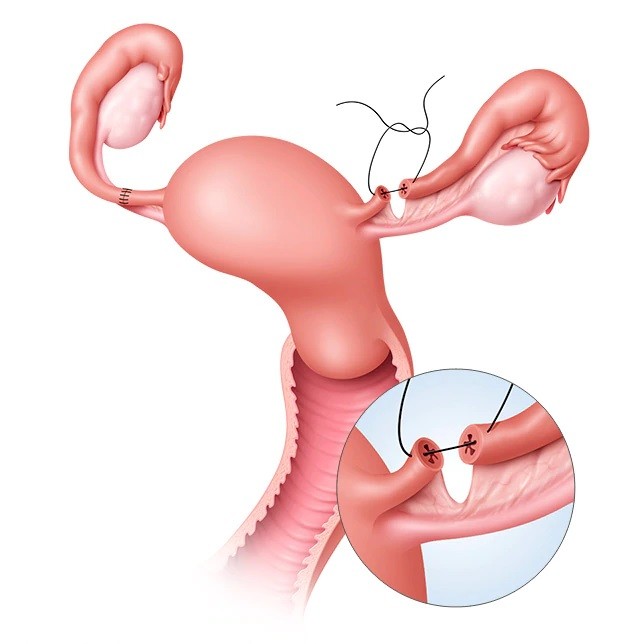Tubal Ligation (Sterilisation) Reversal
Dr Derek Lok has performed several hundred microsurgical tubal reanastomosis using a small open incision (mini-laparotomy) and we now find that almost all procedures can be performed laparoscopically (or minimally invasively) with less tissue handling and higher precision, hence better results and recoveries.
Tubal ligation reversal surgery is similar to your initial laparoscopic tubal ligation, which presumably was done through a few small 0.5cm “keyholes”.
You can expect to go home a few hours after the surgery enjoying a similar quick recovery.

We have achieved a 40% take-home baby rate for women aged 40-45; and 80-90% in the younger women.
Using our procedure, women less than 40 with fertile partners have been shown to have 80-90 % successful outcome (Petrucco, 1999).
Women over 40 years of age have reduced fertility and are usually advised that IVF is necessary to become successfully pregnant rather than surgery. We have proven this is a misconception having achieved significantly better results with surgery when compared to IVF. Australia wide IVF results indicate a cumulative live birth rates of 10-21 % (1 to multiple cycles – newest ANZARD data – MJA 7/8/2017) for women at 40 or older.
With the low pregnancy rates per cycle of IVF treatment for women over the age of 40 (or younger women with poor ovarian reserve), such that multiple cycles of IVF treatments needed for average success often unachievable for financially, psychological or physically reasons. Successful reversal will permit women with expected low IVF success rates to have unlimited number of attempts, the latter is highly important in achieving the ultimate successes of 40% in this group of women with the oldest at age 47 (Petrucco & Silbert MJA 3/9/2007).
The Procedure
Having performed several hundred microsurgical tubal re-anastomosis using small open incisions we now find that almost all procedures can be performed laparoscopically.
Advantages
Endoscopic surgery has many inherent advantages:
- Microsurgical principles can be maintained with camera magnification allowing fine suturing to be used.
- Operating in a closed abdominal cavity avoids drying of internal organs which are minimally handled thus preventing scar tissue formation.
- The use of irrigating fluid to keep tissues moist ,avoidance of surgical packs all lead to less traumatic surgery and quicker postoperative recovery.
- The field of vision is superior to older methods so that other abnormalities such as scar tissue or the commonly encountered condition “endometriosis” can be treated at the same time.
- Both animal and human studies have shown that the laparoscopic approach is superior in reducing scar tissue formation following surgery when compared to open surgery. (Lok 2003).
Results and Success Rates
The success rates from tubal reversal are exceptional is excellent with 90% to 98% of women who undergo the operation achieving open Fallopian Tubes. For women less than 40 with fertile partners have been shown to have 80-90 % successful outcome when “clips” or “rings” were used for sterilisation (Petrucco 1999). Reversal of more destructive methods “cut & tie” and “cautery” give less optimal results because of greater damage to the fallopian tubes resulting in a shorter tube after rejoining.
For the average woman undergoing tubal reversal 55-90% achieve pregnancy (table below showed results from some of bigger studies open and laparoscopically).
The most important factor influencing the pregnancy related success rate is female age. The older you are, the lower the chance of a successful pregnancy. This is due the declining number of normal eggs within your ovaries as you get older. In addition, increasing age also increases the chance of miscarriage and the possibility of having a baby with a genetic problem such as Down syndrome.
Should pregnancy not occur by 12 months following the operation the chance of subsequent pregnancy starts to fall considerably.
Costs
The cost of tubal reversal is made up of 3 components that are:
Surgical Fees
We regard ourselves as a medical service, not a commercial business, and charge according to the complexity and length of the surgery, in line with Australian Medical Association (AMA) recommended Fees.
The surgical Fee for laparoscopic tubal reversal is $4,500 plus assistant fee (usually 10-20%). If you are an Australian citizen and do have health insurance the approximate out of pocket cost of tubal reversal surgery is around $3,100-3,500.
Anaesthetic Fees
Fees for anaesthesia may vary according to the anaesthetist, the length and complexity of your surgery and the hospital or day surgery that you choose to attend. The fee usually around $1,500 (you can then claim back a few hundred dollars from Medicare and your private health fund if you have one).
Hospital Fees
If you have top-level health insurance that covers tubal reversal and you have not elected to have a gap payment, then it is highly likely that your insurance will cover all of your hospital fees (but not the doctors’ fees). As all funds do not rebate the same you should contact the Hospital of your preference to ascertain the exact amount and method of payment and/or rebate.
If you do not hold health insurance or only have ‘ancillary’ or ‘basic’ cover then it is likely that you will have to pay for the entire hospital cost for both surgery and accommodation. Unfortunately the procedure is not supported by State Government so usually cannot be performed in public hospitals. This is the reason why the final out of pocket expense will be higher, can range from $6,980 to $10,200.
Surgical Booking Payment
A surgical fee payment of $4,500 is required 2 weeks prior to the date of your operation to confirm your place on Dr Lok’s operating list.
A cancellation fee of $500 is payable for cancellation of surgery less than 2 weeks prior to the date of operation. This amount will be refunded if a future booking for surgery is made.
Frequently Asked Questions
-
Is ectopic pregnancy a significant risk?
In our experience the risk of ectopic pregnancy has not been higher than expected following reversal surgery when clips or rings were used for sterilization with the chance of ectopic increases from 0.3% to 1% (may be higher in cut & tie and cautery sterilisation). While uncommon, the advice is that an early pregnancy ultrasound is essential with the aim of excluding this condition.
-
Does my partner need to be tested before reversal?
Males should have an up to date semen assessment even with proven paternity. Very abnormal results may indicate the need to consider IVF rather than reversal surgery.
-
How soon can I try to conceive?
You can have sex as soon as you feel physically fit, but you may lower the risks of ectopic pregnancy by avoiding conception while tubes are healing (first 1-2 months following surgery).
-
How do I know that my tubes are open again?
This can be checked by dye study either by ultrasound (Hycosy) or better through hysterosalpingogram (HSG) by X-ray, ideally performed at least a couple of months after the surgery.
-
What other complications are associated with reversal surgery?
Endoscopic surgery may be associated with complications such as haemorrhage, infection, and damage to pelvic and abdominal organs and clotting in leg veins. The risk of these is low and will be fully discussed. You will also be given reading material that will enable you to be fully informed before signing a surgical consent form prior to surgery. Instructions to be observed following surgery will also be given to you before discharge.
Dr Lok has 25+ years of experience performing microsurgical surgery, having performed hundreds of tubal ligation sterilisations and reversal surgeries using the microsurgical keyhole approach.
Dr Lok seeks to provide his patients with the absolute best chance of restoring normal reproductive function through evidence-based medicine and surgery, with the ultimate goal of helping to achieve a successful pregnancy, naturally or through assisted reproductive technologies.
Have a Question or Enquiry?
If you have a question on enquiry related to fertility medicine or a related treatment, please get in touch and one of our friendly team will get back to you.

